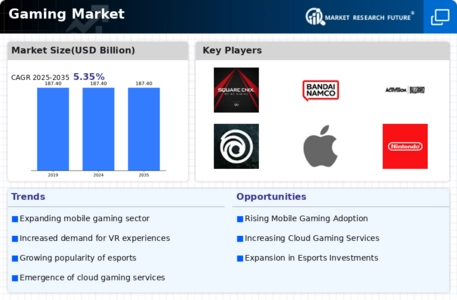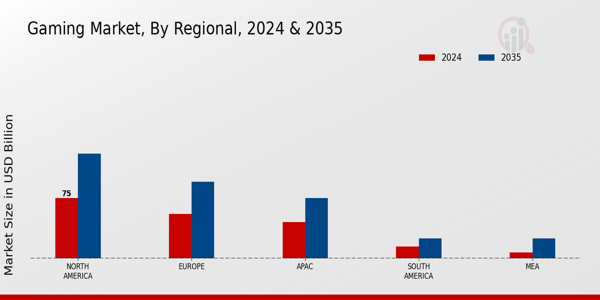PC
Console
Mobile
Cloud Gaming
Handheld
Action
Adventure
Role-Playing
Simulation
Sports
Premium
Freemium
Subscription
In-App Purchases
Advertising
Casual Gamers
Hardcore Gamers
Professional Gamers
Streamers
North America
Europe
South America
Asia Pacific
Middle East and Africa
North America Outlook (USD Billion, 2019-2035)
North America Gaming Market by Platform Type
PC
Console
Mobile
Cloud Gaming
Handheld
North America Gaming Market by Game Type
Action
Adventure
Role-Playing
Simulation
Sports
North America Gaming Market by Monetization Model Type
Premium
Freemium
Subscription
In-App Purchases
Advertising
North America Gaming Market by Player Type
Casual Gamers
Hardcore Gamers
Professional Gamers
Streamers
North America Gaming Market by Regional Type
US
Canada
US Outlook (USD Billion, 2019-2035)
US Gaming Market by Platform Type
PC
Console
Mobile
Cloud Gaming
Handheld
US Gaming Market by Game Type
Action
Adventure
Role-Playing
Simulation
Sports
US Gaming Market by Monetization Model Type
Premium
Freemium
Subscription
In-App Purchases
Advertising
US Gaming Market by Player Type
Casual Gamers
Hardcore Gamers
Professional Gamers
Streamers
CANADA Outlook (USD Billion, 2019-2035)
CANADA Gaming Market by Platform Type
PC
Console
Mobile
Cloud Gaming
Handheld
CANADA Gaming Market by Game Type
Action
Adventure
Role-Playing
Simulation
Sports
CANADA Gaming Market by Monetization Model Type
Premium
Freemium
Subscription
In-App Purchases
Advertising
CANADA Gaming Market by Player Type
Casual Gamers
Hardcore Gamers
Professional Gamers
Streamers
Europe Outlook (USD Billion, 2019-2035)
Europe Gaming Market by Platform Type
PC
Console
Mobile
Cloud Gaming
Handheld
Europe Gaming Market by Game Type
Action
Adventure
Role-Playing
Simulation
Sports
Europe Gaming Market by Monetization Model Type
Premium
Freemium
Subscription
In-App Purchases
Advertising
Europe Gaming Market by Player Type
Casual Gamers
Hardcore Gamers
Professional Gamers
Streamers
Europe Gaming Market by Regional Type
Germany
UK
France
Russia
Italy
Spain
Rest of Europe
GERMANY Outlook (USD Billion, 2019-2035)
GERMANY Gaming Market by Platform Type
PC
Console
Mobile
Cloud Gaming
Handheld
GERMANY Gaming Market by Game Type
Action
Adventure
Role-Playing
Simulation
Sports
GERMANY Gaming Market by Monetization Model Type
Premium
Freemium
Subscription
In-App Purchases
Advertising
GERMANY Gaming Market by Player Type
Casual Gamers
Hardcore Gamers
Professional Gamers
Streamers
UK Outlook (USD Billion, 2019-2035)
UK Gaming Market by Platform Type
PC
Console
Mobile
Cloud Gaming
Handheld
UK Gaming Market by Game Type
Action
Adventure
Role-Playing
Simulation
Sports
UK Gaming Market by Monetization Model Type
Premium
Freemium
Subscription
In-App Purchases
Advertising
UK Gaming Market by Player Type
Casual Gamers
Hardcore Gamers
Professional Gamers
Streamers
FRANCE Outlook (USD Billion, 2019-2035)
FRANCE Gaming Market by Platform Type
PC
Console
Mobile
Cloud Gaming
Handheld
FRANCE Gaming Market by Game Type
Action
Adventure
Role-Playing
Simulation
Sports
FRANCE Gaming Market by Monetization Model Type
Premium
Freemium
Subscription
In-App Purchases
Advertising
FRANCE Gaming Market by Player Type
Casual Gamers
Hardcore Gamers
Professional Gamers
Streamers
RUSSIA Outlook (USD Billion, 2019-2035)
RUSSIA Gaming Market by Platform Type
PC
Console
Mobile
Cloud Gaming
Handheld
RUSSIA Gaming Market by Game Type
Action
Adventure
Role-Playing
Simulation
Sports
RUSSIA Gaming Market by Monetization Model Type
Premium
Freemium
Subscription
In-App Purchases
Advertising
RUSSIA Gaming Market by Player Type
Casual Gamers
Hardcore Gamers
Professional Gamers
Streamers
ITALY Outlook (USD Billion, 2019-2035)
ITALY Gaming Market by Platform Type
PC
Console
Mobile
Cloud Gaming
Handheld
ITALY Gaming Market by Game Type
Action
Adventure
Role-Playing
Simulation
Sports
ITALY Gaming Market by Monetization Model Type
Premium
Freemium
Subscription
In-App Purchases
Advertising
ITALY Gaming Market by Player Type
Casual Gamers
Hardcore Gamers
Professional Gamers
Streamers
SPAIN Outlook (USD Billion, 2019-2035)
SPAIN Gaming Market by Platform Type
PC
Console
Mobile
Cloud Gaming
Handheld
SPAIN Gaming Market by Game Type
Action
Adventure
Role-Playing
Simulation
Sports
SPAIN Gaming Market by Monetization Model Type
Premium
Freemium
Subscription
In-App Purchases
Advertising
SPAIN Gaming Market by Player Type
Casual Gamers
Hardcore Gamers
Professional Gamers
Streamers
REST OF EUROPE Outlook (USD Billion, 2019-2035)
REST OF EUROPE Gaming Market by Platform Type
PC
Console
Mobile
Cloud Gaming
Handheld
REST OF EUROPE Gaming Market by Game Type
Action
Adventure
Role-Playing
Simulation
Sports
REST OF EUROPE Gaming Market by Monetization Model Type
Premium
Freemium
Subscription
In-App Purchases
Advertising
REST OF EUROPE Gaming Market by Player Type
Casual Gamers
Hardcore Gamers
Professional Gamers
Streamers
APAC Outlook (USD Billion, 2019-2035)
APAC Gaming Market by Platform Type
PC
Console
Mobile
Cloud Gaming
Handheld
APAC Gaming Market by Game Type
Action
Adventure
Role-Playing
Simulation
Sports
APAC Gaming Market by Monetization Model Type
Premium
Freemium
Subscription
In-App Purchases
Advertising
APAC Gaming Market by Player Type
Casual Gamers
Hardcore Gamers
Professional Gamers
Streamers
APAC Gaming Market by Regional Type
China
India
Japan
South Korea
Malaysia
Thailand
Indonesia
Rest of APAC
CHINA Outlook (USD Billion, 2019-2035)
CHINA Gaming Market by Platform Type
PC
Console
Mobile
Cloud Gaming
Handheld
CHINA Gaming Market by Game Type
Action
Adventure
Role-Playing
Simulation
Sports
CHINA Gaming Market by Monetization Model Type
Premium
Freemium
Subscription
In-App Purchases
Advertising
CHINA Gaming Market by Player Type
Casual Gamers
Hardcore Gamers
Professional Gamers
Streamers
INDIA Outlook (USD Billion, 2019-2035)
INDIA Gaming Market by Platform Type
PC
Console
Mobile
Cloud Gaming
Handheld
INDIA Gaming Market by Game Type
Action
Adventure
Role-Playing
Simulation
Sports
INDIA Gaming Market by Monetization Model Type
Premium
Freemium
Subscription
In-App Purchases
Advertising
INDIA Gaming Market by Player Type
Casual Gamers
Hardcore Gamers
Professional Gamers
Streamers
JAPAN Outlook (USD Billion, 2019-2035)
JAPAN Gaming Market by Platform Type
PC
Console
Mobile
Cloud Gaming
Handheld
JAPAN Gaming Market by Game Type
Action
Adventure
Role-Playing
Simulation
Sports
JAPAN Gaming Market by Monetization Model Type
Premium
Freemium
Subscription
In-App Purchases
Advertising
JAPAN Gaming Market by Player Type
Casual Gamers
Hardcore Gamers
Professional Gamers
Streamers
SOUTH KOREA Outlook (USD Billion, 2019-2035)
SOUTH KOREA Gaming Market by Platform Type
PC
Console
Mobile
Cloud Gaming
Handheld
SOUTH KOREA Gaming Market by Game Type
Action
Adventure
Role-Playing
Simulation
Sports
SOUTH KOREA Gaming Market by Monetization Model Type
Premium
Freemium
Subscription
In-App Purchases
Advertising
SOUTH KOREA Gaming Market by Player Type
Casual Gamers
Hardcore Gamers
Professional Gamers
Streamers
MALAYSIA Outlook (USD Billion, 2019-2035)
MALAYSIA Gaming Market by Platform Type
PC
Console
Mobile
Cloud Gaming
Handheld
MALAYSIA Gaming Market by Game Type
Action
Adventure
Role-Playing
Simulation
Sports
MALAYSIA Gaming Market by Monetization Model Type
Premium
Freemium
Subscription
In-App Purchases
Advertising
MALAYSIA Gaming Market by Player Type
Casual Gamers
Hardcore Gamers
Professional Gamers
Streamers
THAILAND Outlook (USD Billion, 2019-2035)
THAILAND Gaming Market by Platform Type
PC
Console
Mobile
Cloud Gaming
Handheld
THAILAND Gaming Market by Game Type
Action
Adventure
Role-Playing
Simulation
Sports
THAILAND Gaming Market by Monetization Model Type
Premium
Freemium
Subscription
In-App Purchases
Advertising
THAILAND Gaming Market by Player Type
Casual Gamers
Hardcore Gamers
Professional Gamers
Streamers
INDONESIA Outlook (USD Billion, 2019-2035)
INDONESIA Gaming Market by Platform Type
PC
Console
Mobile
Cloud Gaming
Handheld
INDONESIA Gaming Market by Game Type
Action
Adventure
Role-Playing
Simulation
Sports
INDONESIA Gaming Market by Monetization Model Type
Premium
Freemium
Subscription
In-App Purchases
Advertising
INDONESIA Gaming Market by Player Type
Casual Gamers
Hardcore Gamers
Professional Gamers
Streamers
REST OF APAC Outlook (USD Billion, 2019-2035)
REST OF APAC Gaming Market by Platform Type
PC
Console
Mobile
Cloud Gaming
Handheld
REST OF APAC Gaming Market by Game Type
Action
Adventure
Role-Playing
Simulation
Sports
REST OF APAC Gaming Market by Monetization Model Type
Premium
Freemium
Subscription
In-App Purchases
Advertising
REST OF APAC Gaming Market by Player Type
Casual Gamers
Hardcore Gamers
Professional Gamers
Streamers
South America Outlook (USD Billion, 2019-2035)
South America Gaming Market by Platform Type
PC
Console
Mobile
Cloud Gaming
Handheld
South America Gaming Market by Game Type
Action
Adventure
Role-Playing
Simulation
Sports
South America Gaming Market by Monetization Model Type
Premium
Freemium
Subscription
In-App Purchases
Advertising
South America Gaming Market by Player Type
Casual Gamers
Hardcore Gamers
Professional Gamers
Streamers
South America Gaming Market by Regional Type
Brazil
Mexico
Argentina
Rest of South America
BRAZIL Outlook (USD Billion, 2019-2035)
BRAZIL Gaming Market by Platform Type
PC
Console
Mobile
Cloud Gaming
Handheld
BRAZIL Gaming Market by Game Type
Action
Adventure
Role-Playing
Simulation
Sports
BRAZIL Gaming Market by Monetization Model Type
Premium
Freemium
Subscription
In-App Purchases
Advertising
BRAZIL Gaming Market by Player Type
Casual Gamers
Hardcore Gamers
Professional Gamers
Streamers
MEXICO Outlook (USD Billion, 2019-2035)
MEXICO Gaming Market by Platform Type
PC
Console
Mobile
Cloud Gaming
Handheld
MEXICO Gaming Market by Game Type
Action
Adventure
Role-Playing
Simulation
Sports
MEXICO Gaming Market by Monetization Model Type
Premium
Freemium
Subscription
In-App Purchases
Advertising
MEXICO Gaming Market by Player Type
Casual Gamers
Hardcore Gamers
Professional Gamers
Streamers
ARGENTINA Outlook (USD Billion, 2019-2035)
ARGENTINA Gaming Market by Platform Type
PC
Console
Mobile
Cloud Gaming
Handheld
ARGENTINA Gaming Market by Game Type
Action
Adventure
Role-Playing
Simulation
Sports
ARGENTINA Gaming Market by Monetization Model Type
Premium
Freemium
Subscription
In-App Purchases
Advertising
ARGENTINA Gaming Market by Player Type
Casual Gamers
Hardcore Gamers
Professional Gamers
Streamers
REST OF SOUTH AMERICA Outlook (USD Billion, 2019-2035)
REST OF SOUTH AMERICA Gaming Market by Platform Type
PC
Console
Mobile
Cloud Gaming
Handheld
REST OF SOUTH AMERICA Gaming Market by Game Type
Action
Adventure
Role-Playing
Simulation
Sports
REST OF SOUTH AMERICA Gaming Market by Monetization Model Type
Premium
Freemium
Subscription
In-App Purchases
Advertising
REST OF SOUTH AMERICA Gaming Market by Player Type
Casual Gamers
Hardcore Gamers
Professional Gamers
Streamers
MEA Outlook (USD Billion, 2019-2035)
MEA Gaming Market by Platform Type
PC
Console
Mobile
Cloud Gaming
Handheld
MEA Gaming Market by Game Type
Action
Adventure
Role-Playing
Simulation
Sports
MEA Gaming Market by Monetization Model Type
Premium
Freemium
Subscription
In-App Purchases
Advertising
MEA Gaming Market by Player Type
Casual Gamers
Hardcore Gamers
Professional Gamers
Streamers
MEA Gaming Market by Regional Type
GCC Countries
South Africa
Rest of MEA
GCC COUNTRIES Outlook (USD Billion, 2019-2035)
GCC COUNTRIES Gaming Market by Platform Type
PC
Console
Mobile
Cloud Gaming
Handheld
GCC COUNTRIES Gaming Market by Game Type
Action
Adventure
Role-Playing
Simulation
Sports
GCC COUNTRIES Gaming Market by Monetization Model Type
Premium
Freemium
Subscription
In-App Purchases
Advertising
GCC COUNTRIES Gaming Market by Player Type
Casual Gamers
Hardcore Gamers
Professional Gamers
Streamers
SOUTH AFRICA Outlook (USD Billion, 2019-2035)
SOUTH AFRICA Gaming Market by Platform Type
PC
Console
Mobile
Cloud Gaming
Handheld
SOUTH AFRICA Gaming Market by Game Type
Action
Adventure
Role-Playing
Simulation
Sports
SOUTH AFRICA Gaming Market by Monetization Model Type
Premium
Freemium
Subscription
In-App Purchases
Advertising
SOUTH AFRICA Gaming Market by Player Type
Casual Gamers
Hardcore Gamers
Professional Gamers
Streamers
REST OF MEA Outlook (USD Billion, 2019-2035)
REST OF MEA Gaming Market by Platform Type
PC
Console
Mobile
Cloud Gaming
Handheld
REST OF MEA Gaming Market by Game Type
Action
Adventure
Role-Playing
Simulation
Sports
REST OF MEA Gaming Market by Monetization Model Type
Premium
Freemium
Subscription
In-App Purchases
Advertising
REST OF MEA Gaming Market by Player Type
Casual Gamers
Hardcore Gamers
Professional Gamers
Streamers

















Leave a Comment